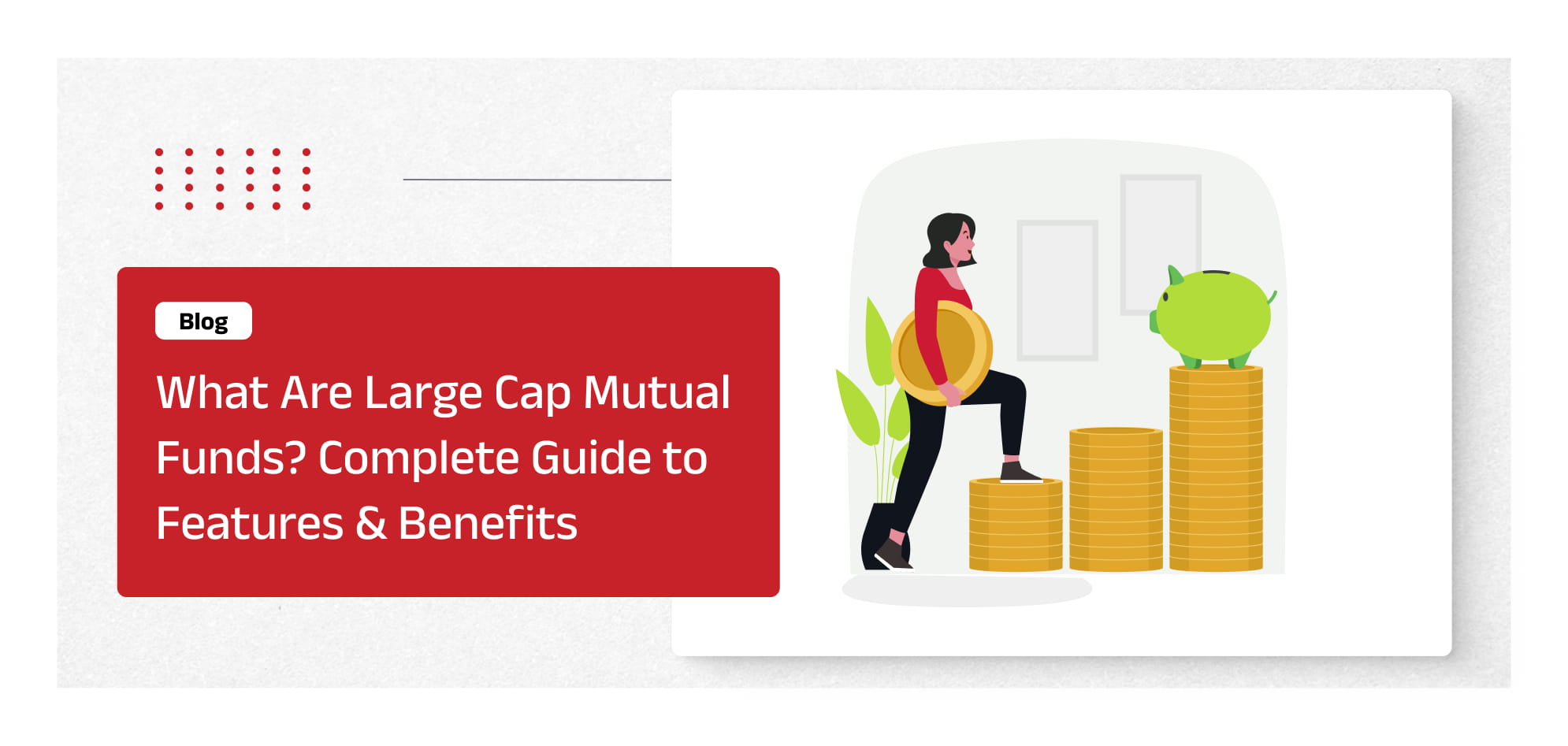-
Our Products
Our FundsFocus Funds
-
Self Care
Self-ServiceFind InformationWays To TransactPartner Solutions
-
Downloads
- Learnings
- About Us
-
More
-
Shareholders
-
Shareholders
-
Updates
-
-
SIP Calculators
- Back
-
Shareholders
What Are Large Cap Mutual Funds? Meaning, Features & Benefits

Aug 25, 2025
5 min
0 Rating
Investment in mutual funds requires multiple thoughtful considerations to ensure maximum benefits and to be aware of the potential issues. Among the different dilemmas, one is deciding the appropriate type of companies for investment. Large-cap mutual funds are particularly notable among the different options owing to reliability, stability and reputation. While they lead a balanced approach for investors looking for equity exposure, there are still associated downsides, such as lower returns. Learn about the large-cap fund meaning and other details to evaluate your options and accordingly make a choice.
What is Market Capitalisation?
A mutual fund is a collective investment that invests a pool of money from multiple investors to purchase a diversified portfolio of securities such as bonds, stocks and other assets. These investments are professionally managed and help generate returns. When a mutual fund investment is in equity (stocks), its portfolio often consists of companies of different market capitalisations. The market capitalisation is the total market value of a company’s outstanding shares.
It is calculated using the formula:
Market capitalisation = Total outstanding shares × Market price per share
Based on market capitalisation, companies are broadly classified into three categories:
Large cap: Companies with the highest market capitalisation, generally stable and established firms
Mid cap: Medium-sized companies with moderate market capitalisation, offering growth potential with balanced risk
Small cap: Smaller companies with lower market capitalisation, generally associated with higher growth potential but increased risk
What is Large Cap Fund?
Now having got a broad idea of market capitalisation, let’s focus on the large-cap fund meaning. So, large-cap mutual funds are equity funds where a large proportion of assets is invested in companies holding large market capitalisation. The investments are safe with such companies, which promise regular returns. It involves reputed companies with lowered risks and a promise of stable performance over time.
The large-cap MF is well-suited for a lower risk appetite at long-term horizons, as they carry less risk in comparison to mid-cap and small-cap companies. As per the Securities and Exchange Board of India (SEBI), the large-cap companies are ranked in the top 100 in terms of market capitalisation.
Features of Large Cap Funds
Large-cap mutual funds’ meaning indicates that they are a worthy option owing to their high stability. Here are more of its features:
Stable returns: Large-cap mutual funds are less impacted by market ups and downs, which enhances their stability relatively. However, it is accompanied by lower returns.
Payment potential: The large-cap mutual funds offer regular dividends, thus being a steady source of income.
Benefits for long-term goals: These funds provide for long-term plans like retirement or future savings. It is because the underperformance during market downtimes is compensated in the long term.
Investment in trusted companies: Large-cap funds put money in well-known and financially strong companies with a solid track record.
Easy to buy and sell: The stocks they invest in are traded often, so investors can easily buy or sell whenever they want.
Benefits of Large Cap Mutual Funds
The large-cap mutual funds offer the following benefits to investors:
Lower risks: The companies’ reputation and high stability protect them from market fluctuations, preventing possible risks to the investments.
Better returns: Though the returns are not high in large-cap mutual funds, they are still better than fixed or traditional investment instruments.
Diverse approach: The large-cap investments can be used for stability and portfolio diversification.
Tax efficiency: The taxation in mutual funds is as per the capital gains tax, which offers better savings in comparison to taxation on income from Fixed Deposits or savings accounts.
Long-term growth: These mutual fund investments serve as a savings option by requiring an investment period of at least 5 to 7 years.
Suitability for Investment in Large Cap Mutual Funds
Now knowing ‘what are large-cap mutual funds’, are you wondering if these investments are the right option for you? Discover it here as we state the individuals for whom they are better suited:
Retirement planning: Investors aiming for the consistent growth of their retirement corpus over time.
Risk-averse investors: Investors preferring lower volatility and stable returns in equity investments.
Long-term investors: Investors looking for investment for a period between 5 to 10 years or more, and capital growth, can opt for large-cap MF.
Wrapping Up!
Large-cap mutual funds are one of the reliable investment options that offer stable returns. The controlled risk environment coming from the reputed companies and strong market presence provides investors with a stable growth opportunity over time. However, being protected from the risk, they also do not offer high returns.
Hence, the investment option, which offers consistency and resilience from the market conditions, must be chosen based on the current financial status and future goals. Go through the different scenarios and proceed with the best option for yourself.
The information herein is meant only for general reading purposes and the views being expressed only constitute opinions and therefore cannot be considered as guidelines, recommendations or as a professional guide for the readers. The document has been prepared on the basis of publicly available information, internally developed data and other sources believed to be reliable. Recipients of this information are advised to rely on their own analysis, interpretations & investigations. Readers are also advised to seek independent professional advice in order to arrive at an informed investment decision.
The Tax is shown above is for general information only. Investors are advised to consult their Tax Consultant or Financial Advisor to determine tax benefits applicable to them.
Mutual Fund investments are subject to market risks, read all scheme related documents carefully.





 1800-270-7000
1800-270-7000



